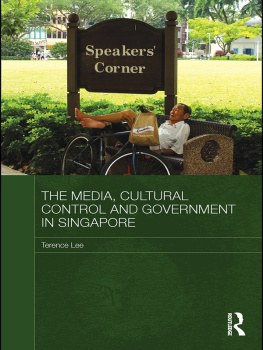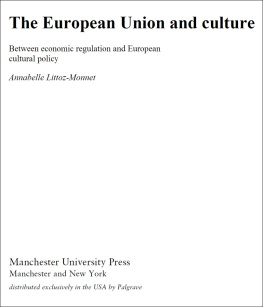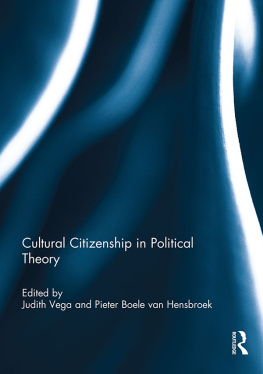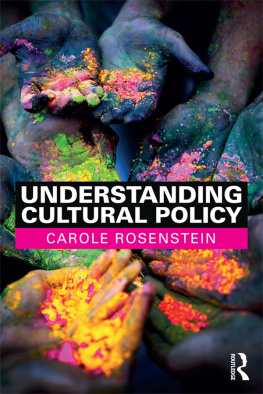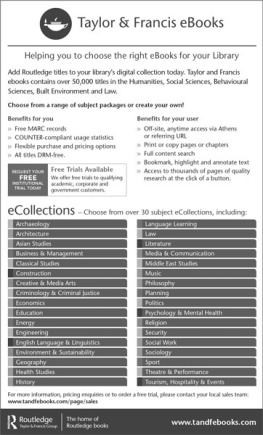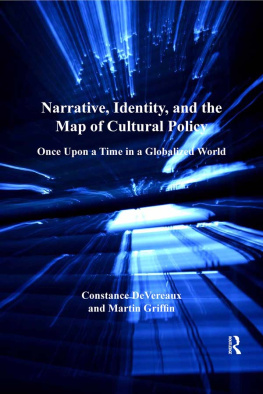Accounting for Culture:
Thinking Through Cultural Citizenship
edited by
Caroline Andrew
Monica Gattinger
M. Sharon Jeannotte
Will Straw
The University of Ottawa Press is grateful for the support of the Department of Canadian Heritage in the publication of this book.
Cover photograph and design: Kevin Matthews
Library and Archives Canada Cataloguing in Publication
Accounting for Culture: thinking through cultural citizenship / edited
by Caroline Andrew, Monica Gattinger, M. Sharon Jeannotte, and Will Straw.
Includes bibliographical references and index.
ISBN 0-7766-0596-8
1. CanadaCultural policy.
2. CanadaIntellectual life21st centuryCitizen participation.
3. CanadaCivilization21st century.
I. Andrew, Caroline, 1942
FC95.5.A32 2005 306.0971 C2005-901624-8
Foreword
Accounting for Culture:
Examining the Building Blocks of Cultural Citizenship
The following are the opening remarks made by Judith A. LaRocque, Deputy Minister for the Department of Canadian Heritage, at a colloquium held in Ottawa in November 2003 celebrating the fifth anniversary of the Canadian Cultural Research Network and the tenth anniversary of the Department of Canadian Heritage.
On behalf of the Department of Canadian Heritage, I would like to welcome you all here tonight on an occasion that marks a number of important milestones.
First, it is the fifth anniversary of the Canadian Cultural Research Network (CCRN), which held its inaugural colloquium in Ottawa in June 1998.
I am pleased that the CCRN has chosen to meet here again five years later, in partnership with the Department of Canadian Heritage and the University of Ottawa, to examine the theme of Accounting for Culture: Examining the Building Blocks of Cultural Citizenship.
For the Department of Canadian Heritage, this colloquium also marks a couple of significant events: the tenth anniversary of our creation and the launch of the Canadian Cultural Observatorys new on-line service, http://www.culturescope.ca.
When the department was formed ten years ago, many wondered about the relationship between its two halves. Just what did culture have to do with citizenship? Why would anyone try to bring together the people who worked with artists and museums and broadcasters with the people who were concerned about official languages, multiculturalism, and citizen participation?
Avec lUniversit dOttawa, je suis certaine que nous allons faire du progrs au cours des deux prochains jours pour rpondre aux questions que je viens de poser.
It is important that we think hard about this because there is a growing realization among cultural policy-makers that economic justifications of cultural and heritage activities are no longer adequate (if they ever were) for policy and advocacy purposes.
We are increasingly concerned with the social and citizenship dimensions of culture. The social dimension does not just mean better measures of consumption and demand for cultural goods. It means understanding how Canadian culture affects citizens and how Canadian citizens interact with and shape their culture. It means understanding cultural diversity, citizen participation, and community building.
As Canada becomes a more diverse place, the sources and kinds of cultural expression become more diverse. We need to understand these cultural changes if our policies are going to help us to benefit from this diversity. We need information on the characteristics of cultural change, and on the effects of cultural participation on people and the motivations which drive them.
Cultural participation is one of the key tools people use to build their sense of attachment and connection to each other. Cultural participation also bridges fault lines and builds common understandings where only difference existed.
Engagement with culture is hard to distinguish from community development and the growth of citizenship. When people engage with culture, they necessarily engage with each other, with people like them in some way, and inevitably with people who are different.
Cultural policy has the potential therefore to reach out beyond the traditional realm of industry, art, and museum to influence citizenship, values, tolerance, and the very construction of Canadian society.
To support these new policy directions, we obviously need different data than we have now. But our needs go beyond data. We need scholarship to understand the relationship between culture and society. We also need theory to link culture to its social effects, and we need conceptual frameworks to help us focus in on the indicators that will really tell us what is going on.
That is why I find the dual themes of this colloquium so interesting and so timely.
Under the Accounting for Culture theme, you are going to look at new tools to support planning, reporting, and assessment of cultural policies and actions. And under the Cultural Citizenship theme, you are going to link these new tools to rebuilding the case for culture, specifically, examining cultures role in supporting new understandings of citizenship and civic participation.
I think that by doing this alone you are breaking important new ground. However, you are doing even more. By inviting the participation of both researchers and policy-makers at this colloquium and by focusing clearly on knowledge transfer as a key element, you are building a bridge between those who think about cultural citizenship and those who will have to address the new policy imperatives of diversity and inclusion.
In the coming months, as Ottawa undertakes the changing of the guard, I believe that there will be a huge appetite for new ideas, for creative approaches to persistent problems, and for what David Zussman of the Public Policy Forum has termed a more evidence-based approach to public policy.
I view this colloquium as an important step in creating those ideas and building the evidence base that we will need to address the emerging issues surrounding cultural citizenship.
Une autre partie trs importante du colloque, et un vnement marquant pour le ministre du Patrimoine canadien, est le lancement du service en ligne de lObservatoire culturel canadien, http://www.culturescope.ca.
LObservatoire culturel canadien est une initiative du ministre du Patrimoine canadien, avec le support du programme Culture Canadienne en ligne. Sa mission est de suivre les dveloppements, dissminer linformation et procurer des occasions de rseautique ceux qui abordent le genre de problmes et de questions qui seront soulevs au colloque durant les deux prochains jours.
Culturescope.ca est destin devenir le guichet unique de linformation culturelle au Canada. Et jespre que a deviendra une des grandes ressources de la base de preuves laquelle je me rfrais plus tt, de mme quun outil pour soutenir lchange continu de connaissances entre les communauts de la recherche et des politiques.
Le dveloppement de culturescope.ca a tir bnfice de deux ans de ractions en provenance de la communaut culturelle du Canada. Et il forme une collaboration grandissante entre tous les niveaux de gouvernement, et entre des partenaires privs et sans but lucratif.
Jusqu maintenant, culturescope.ca est soutenu grce la participation de plusieurs partenaires, incluant Statistique Canada, Bibliothque et Archives Canada, la Confrence canadienne des arts, le Rseau des villes cratives et le Rseau canadien de recherche culturelle, pour nen nommer que quelques-uns.
En fait, le Rseau canadien de recherche culturelle a accept de participer en donnant une priode dessai culturescope.ca, par la cration de groupes de travail de politiques en ligne qui refltent les thmes discuts durant les deux prochain jours. Jespre que culturescope.ca va effectivement largir le dbat, les discussions et le momentum jusqu la prochaine occasion de se rassembler.


